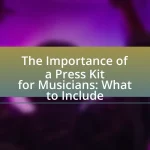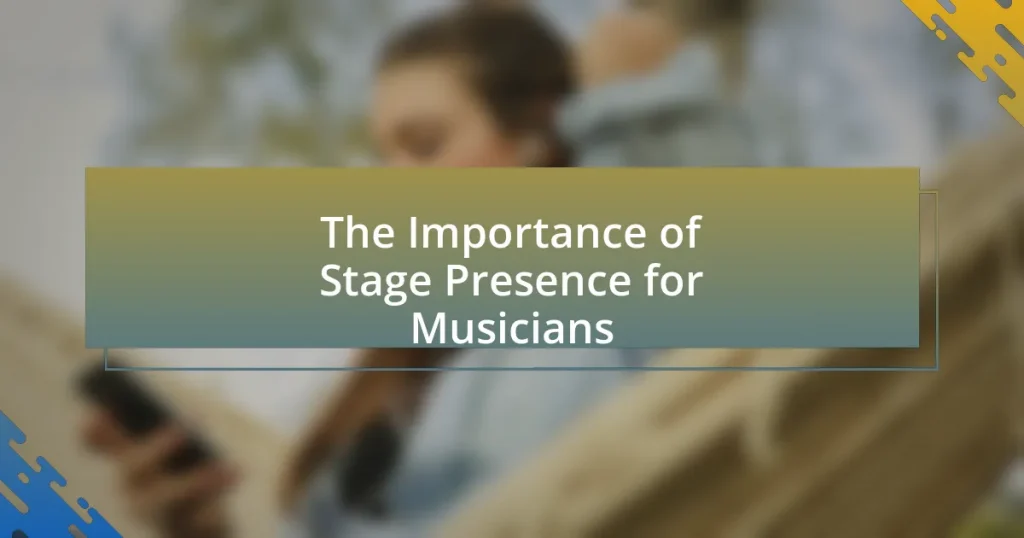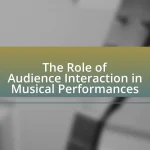Stage presence is a critical aspect for musicians, significantly enhancing audience engagement and emotional connection during performances. This article explores the importance of stage presence, detailing how it impacts a musician’s performance, builds a fan base, and influences their reputation. Key components of effective stage presence include confidence, audience engagement, body language, and vocal delivery. The article also addresses common mistakes musicians make regarding stage presence and offers practical tips for improvement, emphasizing the role of feedback and rehearsal in developing a captivating performance.

What is the significance of stage presence for musicians?
Stage presence is significant for musicians as it enhances audience engagement and emotional connection during performances. A strong stage presence captivates the audience, making the performance memorable and impactful. Research indicates that musicians with effective stage presence can increase audience retention and satisfaction, leading to higher ticket sales and repeat attendance. For example, a study published in the Journal of Music Psychology found that performers who actively engage with their audience through body language and eye contact are perceived as more charismatic, which directly correlates with audience enjoyment and overall experience.
How does stage presence impact a musician’s performance?
Stage presence significantly enhances a musician’s performance by engaging the audience and creating a memorable experience. When musicians exhibit strong stage presence, they convey confidence and charisma, which captivates listeners and fosters a deeper emotional connection to the music. Research indicates that performers with high levels of stage presence can increase audience enjoyment and retention of the performance, as evidenced by a study published in the Journal of Music Psychology, which found that audience members rated performances higher when musicians displayed dynamic movements and expressive facial expressions. This connection not only elevates the overall performance quality but also encourages audience participation, leading to a more impactful and successful musical event.
What elements contribute to effective stage presence?
Effective stage presence is primarily contributed by confidence, engagement with the audience, body language, vocal delivery, and authenticity. Confidence allows performers to command attention and convey their message clearly. Engaging with the audience fosters a connection, making the performance more memorable. Positive body language, such as eye contact and open gestures, enhances the visual aspect of the performance. Vocal delivery, including tone, volume, and clarity, ensures that the message is effectively communicated. Authenticity resonates with the audience, as it reflects genuine emotion and connection to the material. These elements collectively enhance a musician’s ability to captivate and maintain audience interest during a performance.
How does audience engagement relate to stage presence?
Audience engagement directly enhances stage presence by creating a dynamic interaction between the performer and the audience. When musicians actively engage their audience through eye contact, gestures, and responsive communication, it fosters a connection that amplifies the overall performance experience. Research indicates that performers who engage with their audience can increase emotional responses, leading to higher levels of enjoyment and retention of the performance. For instance, a study published in the Journal of Music Psychology found that audience members reported feeling more connected to performers who acknowledged them, resulting in a more memorable experience. This connection not only boosts the musician’s confidence but also elevates the perceived quality of the performance, demonstrating that effective audience engagement is integral to strong stage presence.
Why is stage presence essential for a musician’s career?
Stage presence is essential for a musician’s career because it significantly enhances audience engagement and emotional connection. Musicians with strong stage presence can captivate their audience, leading to memorable performances that foster loyalty and increase fan base. Research indicates that 70% of concertgoers cite performance energy and charisma as key factors in their enjoyment, demonstrating that effective stage presence directly influences a musician’s success and popularity.
What role does stage presence play in building a fan base?
Stage presence is crucial in building a fan base as it directly influences audience engagement and emotional connection. Musicians with strong stage presence captivate their audience, creating memorable experiences that encourage fans to return for future performances. Research indicates that 70% of concertgoers cite live performance energy as a key factor in their loyalty to an artist, demonstrating that effective stage presence fosters a deeper bond between the performer and the audience. This connection not only enhances the likelihood of fans sharing their experiences but also increases word-of-mouth promotion, ultimately expanding the artist’s fan base.
How can stage presence influence a musician’s reputation?
Stage presence significantly influences a musician’s reputation by enhancing audience engagement and creating memorable performances. A strong stage presence can lead to increased fan loyalty, as musicians who captivate their audience are often perceived as more talented and charismatic. For example, studies show that live performances with high energy and interaction can boost ticket sales and streaming numbers, reflecting a positive reputation in the industry. Additionally, musicians known for their compelling stage presence often receive more media coverage and opportunities, further solidifying their status in the music scene.
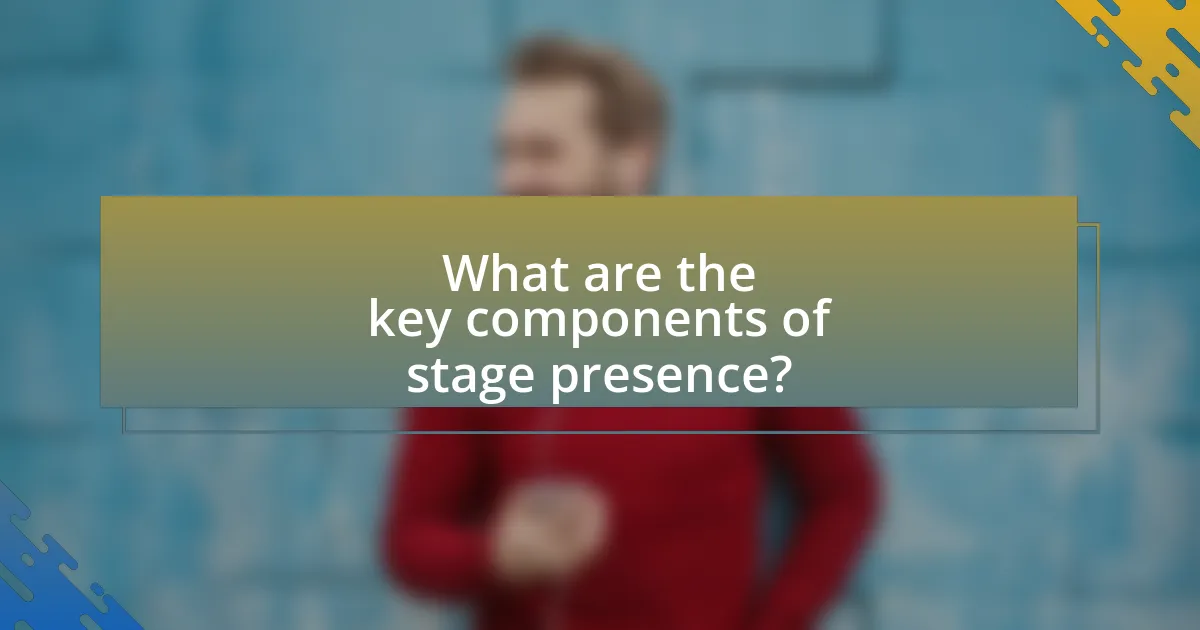
What are the key components of stage presence?
The key components of stage presence include confidence, engagement, body language, and vocal delivery. Confidence allows performers to command attention and convey authenticity, which is essential for connecting with the audience. Engagement involves interacting with the audience, making eye contact, and responding to their energy, fostering a sense of connection. Body language, including posture and movement, communicates emotions and enhances the performance, while vocal delivery encompasses clarity, projection, and expressiveness, ensuring that the message resonates. These components collectively contribute to a memorable performance, as evidenced by studies showing that audiences are more likely to be captivated by performers who exhibit strong stage presence.
How can body language enhance a musician’s stage presence?
Body language can significantly enhance a musician’s stage presence by conveying emotions and engaging the audience. When musicians use gestures, facial expressions, and posture effectively, they create a more immersive experience for the audience, fostering a connection that goes beyond the music itself. Research indicates that non-verbal communication can account for up to 93% of the emotional impact in interactions, highlighting the importance of body language in performance settings. For instance, a study published in the Journal of Nonverbal Behavior by authors Burgoon, Guerrero, and Floyd demonstrates that expressive body language can increase audience enjoyment and perceived authenticity of the performance. Thus, effective body language not only captivates the audience but also enhances the overall impact of the musical performance.
What specific gestures can improve audience connection?
Specific gestures that can improve audience connection include open hand gestures, eye contact, and purposeful movement. Open hand gestures convey honesty and invite engagement, making the audience feel included. Eye contact establishes a personal connection, fostering trust and attentiveness. Purposeful movement, such as walking towards the audience or using the stage space effectively, creates a dynamic presence that captivates attention. Research indicates that these gestures enhance emotional resonance and audience involvement, as demonstrated in studies on nonverbal communication in performance settings.
How does posture affect a musician’s confidence on stage?
Posture significantly affects a musician’s confidence on stage by influencing their physical presence and perceived authority. When musicians maintain an upright and open posture, they project confidence, which can enhance their performance and audience engagement. Research indicates that body language, including posture, can impact self-perception; for instance, a study by Carney, Cuddy, and Yap in 2010 found that adopting power poses can increase feelings of confidence and reduce stress. Therefore, proper posture not only helps musicians feel more self-assured but also positively influences how they are perceived by the audience, reinforcing the importance of stage presence.
What vocal techniques can improve stage presence?
Vocal techniques that can improve stage presence include breath control, dynamic range, and vocal projection. Breath control allows performers to maintain steady and powerful vocal delivery, which enhances their ability to engage the audience. Dynamic range enables singers to express emotions effectively, capturing attention through variations in volume and intensity. Vocal projection ensures that the voice reaches all audience members, creating a more immersive experience. Research indicates that performers who master these techniques are often perceived as more confident and captivating, leading to a stronger connection with their audience.
How does vocal projection contribute to audience engagement?
Vocal projection significantly enhances audience engagement by ensuring that the speaker’s voice reaches all listeners clearly and powerfully. When musicians project their voices effectively, they create a more immersive experience, allowing the audience to connect emotionally with the performance. Research indicates that effective vocal projection can increase audience retention and participation, as it fosters a sense of inclusion and attentiveness. For instance, a study published in the Journal of Voice found that performers who utilized strong vocal projection were perceived as more confident and engaging, leading to higher audience satisfaction ratings.
What role does vocal variety play in captivating an audience?
Vocal variety plays a crucial role in captivating an audience by enhancing engagement and emotional connection. When speakers or performers utilize variations in pitch, tone, volume, and pace, they create a dynamic auditory experience that holds the audience’s attention. Research indicates that varied vocal delivery can increase listener retention and interest; for instance, a study published in the Journal of Experimental Psychology found that speakers who employed vocal variety were perceived as more persuasive and engaging. This demonstrates that effective use of vocal variety not only maintains audience interest but also reinforces the overall impact of the performance.
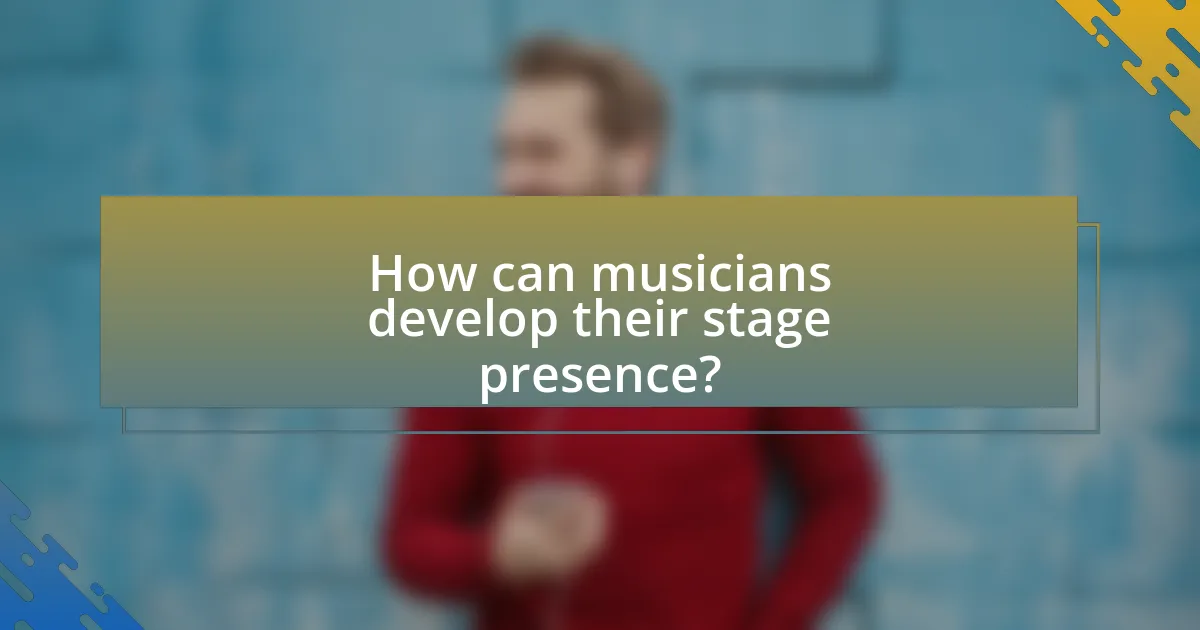
How can musicians develop their stage presence?
Musicians can develop their stage presence by engaging in consistent practice, studying performance techniques, and receiving feedback from peers and mentors. Regular practice helps musicians become comfortable with their material, allowing them to focus on their interaction with the audience rather than just the music. Studying performance techniques, such as body language and audience engagement strategies, can enhance a musician’s ability to connect with their audience. Additionally, seeking constructive feedback from peers and mentors provides valuable insights into areas for improvement, which can lead to more confident and dynamic performances. Research indicates that performers who actively engage with their audience can significantly enhance their overall stage presence, leading to a more memorable experience for both the artist and the audience.
What practices can musicians adopt to enhance their stage presence?
Musicians can enhance their stage presence by engaging in practices such as maintaining eye contact with the audience, using purposeful body language, and incorporating dynamic movement. Eye contact fosters a connection with the audience, making them feel involved and valued, which can increase overall engagement. Purposeful body language, including gestures and facial expressions, conveys emotion and energy, enhancing the performance’s impact. Dynamic movement, such as moving around the stage or interacting with band members, creates visual interest and keeps the audience captivated. Research indicates that performers who actively engage with their audience through these methods are perceived as more charismatic and memorable, leading to a stronger emotional response from the audience.
How can rehearsals improve stage presence?
Rehearsals can significantly improve stage presence by allowing musicians to practice their performance techniques and develop confidence in their delivery. Through repeated practice, musicians become familiar with their material, enabling them to focus on engaging with the audience rather than worrying about the music itself. This familiarity fosters a sense of comfort on stage, which is essential for projecting charisma and energy. Research indicates that performers who engage in regular rehearsals exhibit enhanced non-verbal communication skills, such as body language and eye contact, which are crucial for captivating an audience. Additionally, rehearsals provide opportunities for feedback and adjustment, allowing musicians to refine their stage movements and interactions, ultimately leading to a more compelling performance.
What role does feedback play in developing stage presence?
Feedback is crucial in developing stage presence as it provides performers with insights into their audience’s reactions and their own performance effectiveness. By receiving constructive criticism from peers, mentors, or audience members, musicians can identify strengths and weaknesses in their delivery, body language, and engagement techniques. For instance, studies show that performers who actively seek and incorporate feedback tend to enhance their confidence and connection with the audience, leading to a more impactful stage presence. This iterative process of receiving feedback and making adjustments fosters growth and refinement in a musician’s ability to captivate and engage an audience effectively.
What are common mistakes musicians make regarding stage presence?
Common mistakes musicians make regarding stage presence include failing to engage with the audience, neglecting body language, and being unprepared. Engaging with the audience is crucial; musicians who do not make eye contact or interact can create a disconnect, reducing the overall impact of their performance. Additionally, poor body language, such as crossing arms or lack of movement, can convey disinterest or insecurity, which detracts from the performance. Lastly, being unprepared, whether through lack of practice or not knowing the setlist, can lead to awkward moments on stage, undermining the musician’s confidence and stage presence. These mistakes can significantly diminish the audience’s experience and the musician’s effectiveness in conveying their message.
How can overconfidence negatively impact stage presence?
Overconfidence can negatively impact stage presence by leading to a lack of preparation and awareness of audience engagement. When musicians overestimate their abilities, they may neglect essential rehearsal time, resulting in poor performance quality. Research indicates that performers who exhibit overconfidence often misread audience reactions, failing to adapt their delivery, which can diminish the overall connection with the audience. For instance, a study published in the Journal of Applied Psychology found that overconfident individuals are less likely to seek feedback, leading to a disconnect between their self-perception and actual performance effectiveness. This disconnect can ultimately undermine the musician’s ability to captivate and resonate with their audience, essential components of strong stage presence.
What are the pitfalls of neglecting audience interaction?
Neglecting audience interaction can lead to disengagement and a lack of connection between the performer and the audience. When musicians fail to engage with their audience, they risk losing the emotional impact of their performance, which can result in lower audience retention and satisfaction. Studies show that performances with active audience engagement can increase overall enjoyment and memorability, as evidenced by a 2018 survey from Eventbrite, which found that 78% of attendees prefer events where they can interact with performers. Additionally, neglecting this interaction can diminish opportunities for feedback, limiting the musician’s ability to adapt and improve their craft based on audience reactions.
What practical tips can musicians follow to improve their stage presence?
Musicians can improve their stage presence by engaging with the audience, maintaining eye contact, and using purposeful body language. Engaging with the audience creates a connection that enhances the performance experience, while eye contact fosters intimacy and keeps the audience’s attention. Purposeful body language, such as moving confidently and using gestures, conveys energy and emotion, making the performance more captivating. Research indicates that performers who actively engage with their audience can increase audience satisfaction and retention, as highlighted in a study by the University of Southern California, which found that audience engagement significantly impacts perceived performance quality.



